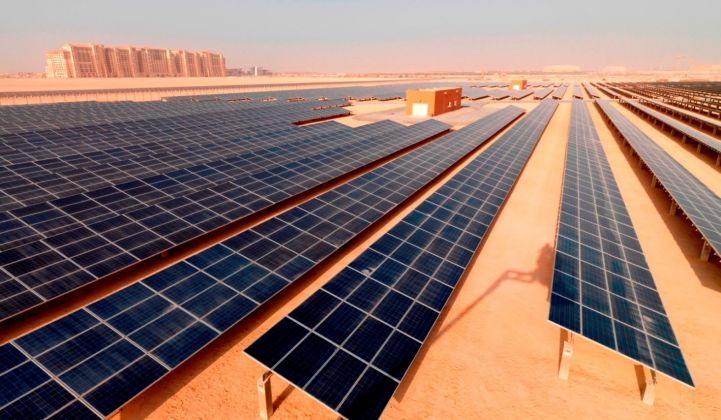Dubai-based solar developer Yellow Door Energy on Monday raised a $65 million Series A to fund an expansion effort in the Middle East.
Yellow Door is one of the largest commercial and industrial-scale solar developers in a region marked more by massive utility-scale development. It has been active in the United Arab Emirates and Jordan, two of the more attractive regional markets for distributed generation.
This raise represents one of the largest venture investments on record for a Middle Eastern solar company, said Ben Attia, who tracks the region for Wood Mackenzie Power & Renewables.
“It’s a positive sign for the Middle East’s distributed PV segment broadly, as more markets slowly open up,” Attia said.
The investors included Mitsui, Equinor Energy Ventures, the Arab Petroleum Investments Corporation and Adenium Energy Capital, Yellow Door’s founding investor. The International Finance Corporation, a World Bank affiliate, also joined the round.
That’s the first downstream solar investment for Equinor, the Norwegian state-backed oil and gas company. It is Mitsui’s first corporate-level investment in Middle East PV, Attia noted; the Japanese industrial conglomerate has invested in grid edge startups including Pxise Energy Solutions, Stem and ForeFront Power.
Yellow Door said it would use the $65 million “to scale its investments in solar energy and energy efficiency solutions in the Middle East and Africa.” That’s a significant dollar amount compared to other investments in these emerging markets (and a hefty Series A for a cleantech startup anywhere in the world).
“DG markets across the region are still lacking clear policy frameworks and cost-reflective retail tariffs, but there are bright spots — Israel, Oman, Nigeria and Senegal are increasingly attractive for C&I projects in particular,” Attia said.
Yellow Door’s projects to date have focused on large commercial clients in the UAE, including the InterContinental Hotel in Abu Dhabi, Nestle’s Dubai campus and a Unilever factory, as well as several hospital and business customers in Jordan.
Saudi Arabia, Bahrain, Jordan, Oman and the UAE will install a cumulative 22.4 gigawatts of solar capacity by 2023, according to Wood Mackenzie research from 2018. Most of that expansion has come from massive projects awarded through competitive reverse auctions.
Behind-the-meter solar has not enjoyed a similar boom. It is hindered in many regional markets by energy subsidies that depress the price for fuel and electricity, making solar less competitive. After analyzing retail subsidies, the 2018 report found that only commercial solar in Jordan and utility-scale solar in Dubai and Jordan delivered appealing economics.




